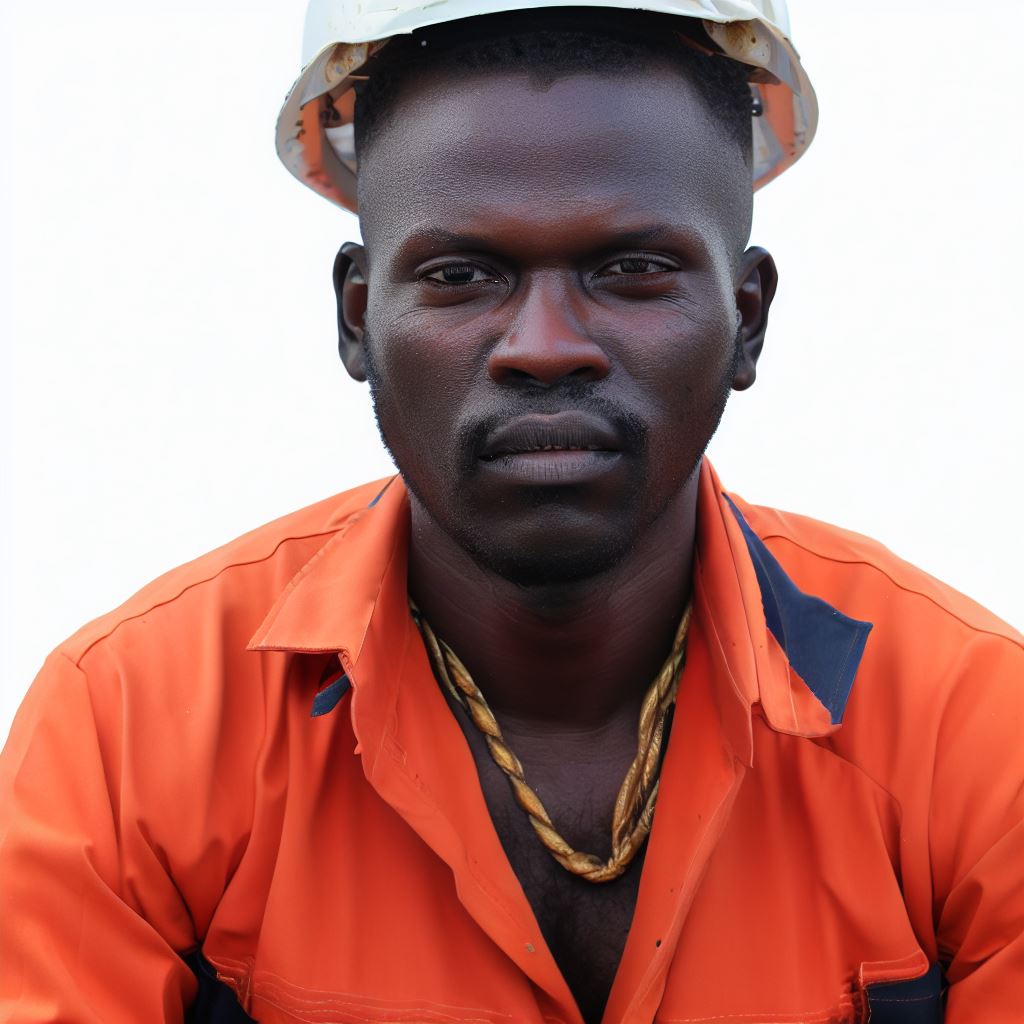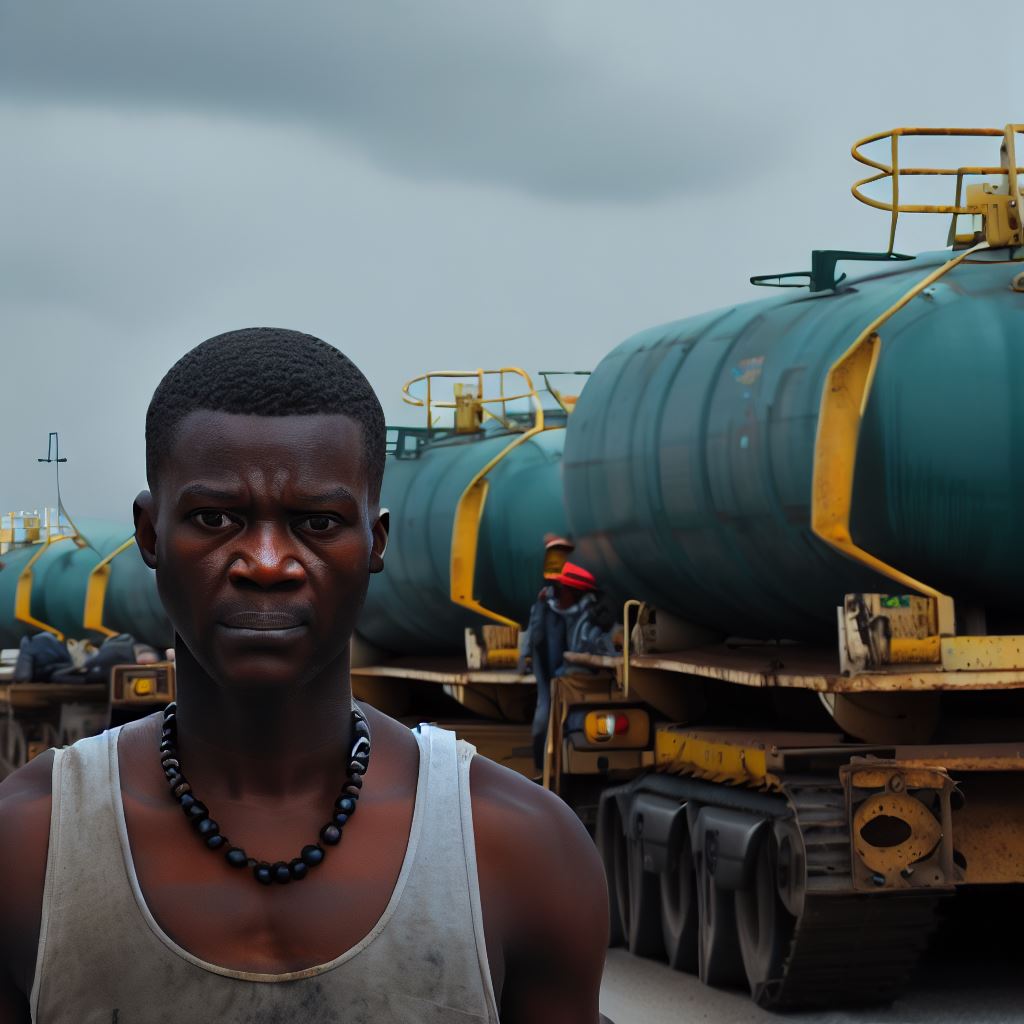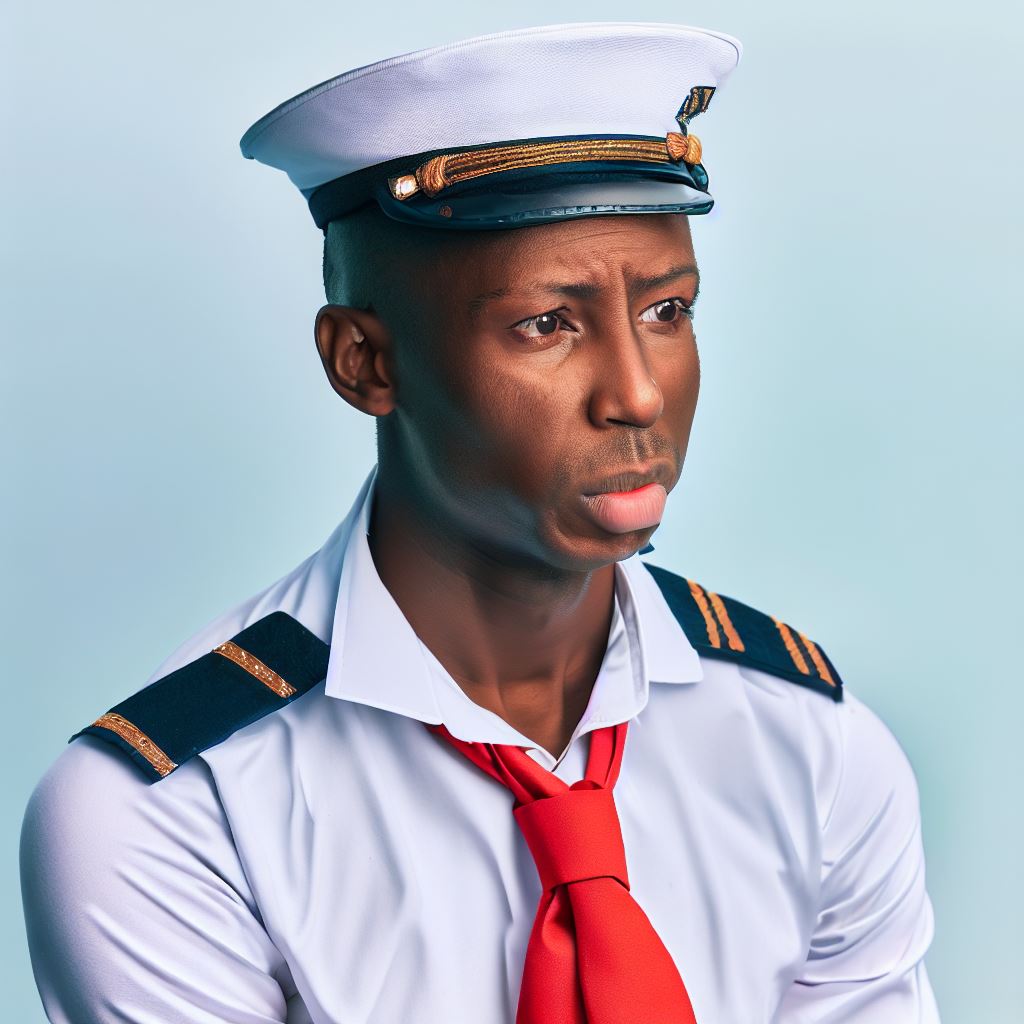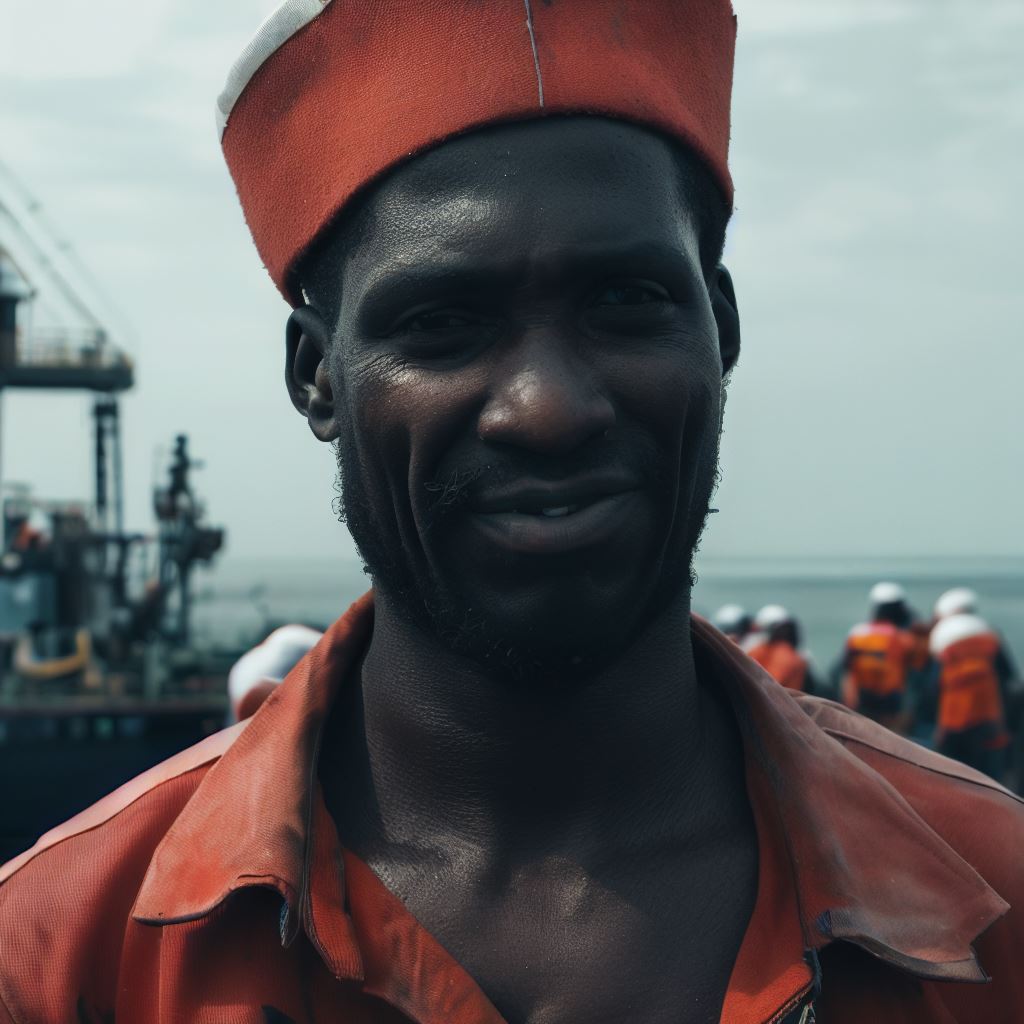Introduction
A. Importance of Safety Protocols for Marine Oilers in Nigeria
Ensuring safety for marine oilers in Nigeria is paramount. Their work involves risks that demand stringent safety protocols.
B. Purpose of the Blog Post
This post is your comprehensive guide to marine oiler safety in Nigeria. Discover essential protocols, best practices, and more.
Overview of Marine Oil Industry in Nigeria
A. Brief overview of the marine oil industry in Nigeria
In Nigeria, the marine oil industry plays a vital role in the country’s economy and energy sector.
With its abundant oil resources, Nigeria is one of the top oil-producing countries in Africa.
The marine oil industry involves the exploration, extraction, refining, and transportation of oil and gas resources located offshore.
It is a complex and high-risk industry that requires strict safety protocols and procedures to ensure the well-being of workers and prevent environmental disasters.
B. Significance of marine oilers in the industry
Marine oilers are a crucial part of the industry and are responsible for various tasks and functions that contribute to the smooth operation of oil rigs and vessels.
They play a significant role in ensuring the safety and efficiency of offshore operations.
C. Their role in ensuring smooth operations and preventing accidents
One of the primary responsibilities of marine oilers is to maintain the machinery and equipment on oil rigs and vessels.
This includes regular inspections, repairs, and maintenance of engines, pumps, pipelines, and other essential components.
Another crucial aspect of their role is to monitor and control the flow of oil and gas during drilling and extraction operations.
Marine oilers must be knowledgeable about the equipment and systems used and ensure they are operating within safe parameters.
Furthermore, marine oilers are involved in emergency response and prevention activities to prevent accidents and mitigate potential risks.
They receive training on firefighting techniques, first aid, and safety procedures to effectively handle emergencies.
Their role extends beyond operational and maintenance tasks
Marine oilers are responsible for monitoring and reporting any unusual or abnormal conditions related to equipment, machinery, or the environment that could potentially lead to accidents or spills.
By actively conducting routine inspections and reporting any anomalies, marine oilers help prevent accidents and ensure the safety of all personnel on board.
They are crucial in maintaining a safe working environment and preventing environmental disasters such as oil spills.
Their expertise and knowledge are valuable in identifying and addressing potential safety hazards, ensuring compliance with industry standards and regulations.
Marine oilers collaborate with other crew members to develop and implement safety protocols and procedures.
The significance of marine oilers in the industry cannot be overstated
Their continuous effort to maintain safety standards and prevent accidents contributes to the overall success and sustainability of the marine oil industry in Nigeria.
In essence, marine oilers play a vital role in the marine oil industry in Nigeria. They are responsible for the maintenance, monitoring, and emergency response activities necessary for smooth operations.
Their expertise and dedication contribute to the safety of personnel and the prevention of environmental disasters.
Read: The Impact of Technology on Sailors in Nigeria’s Navy
Importance of Safety Protocols for Marine Oilers
A. Potential Risks and Hazards Faced by Marine Oilers
- Exposure to hazardous substances, such as oil spills and toxic gases.
- Injuries caused by moving machinery, heavy equipment, or slippery surfaces.
- Fire and explosion risks due to the flammable nature of the materials involved.
- Weather-related dangers like strong winds, storms, and rough seas.
- Physical strain from heavy lifting, repetitive tasks, and long working hours.
B. The Importance of Safety Protocols for Their Protection
- Protecting the health and well-being of marine Oilers is a moral obligation.
- Implementing safety protocols ensures compliance with international standards and regulations.
- Enhancing safety measures helps to mitigate potential liabilities and financial losses.
- Preventing accidents and injuries ensures the continuity of operations and avoids disruptions.
- Promoting a culture of safety fosters employee morale, productivity, and loyalty.
C. How Following Safety Protocols Can Prevent Accidents and Injuries
1. Awareness and Training
- Regular safety training sessions familiarize marine Oilers with risks and how to mitigate them.
- Knowing the proper use of safety equipment and how to respond in emergency situations is crucial.
2. Usage of Personal Protective Equipment (PPE)
- Wearing appropriate PPE, such as helmets, goggles, gloves, and safety shoes, provides necessary protection.
- Effective use of PPE minimizes the risk of injuries and exposure to hazardous substances.
3. Implementation of Standard Operating Procedures (SOPs)
- Having well-defined SOPs for routine tasks ensures consistency and reduces the likelihood of errors.
- Following established protocols minimizes accidents and maintains efficient operations.
4. Regular Safety Inspections and Maintenance
- Scheduled inspections of equipment, machinery, and safety systems prevent breakdowns and malfunctions.
- Regular maintenance and prompt repairs decrease the risk of accidents caused by faulty machinery or systems.
5. Communication and Reporting
- Establishing effective communication channels allows Oilers to report potential hazards and incidents.
- Prompt reporting enables timely interventions and preventive actions to ensure safety.
6. Emergency Preparedness and Drills
- Conducting regular emergency drills prepares Oilers to respond quickly and effectively in critical situations.
- Knowing evacuation procedures and the location of emergency equipment minimizes panic and maximizes safety.
7. Risk Assessment and Continuous Improvement
- Performing regular risk assessments identifies potential hazards and guides the development of preventive measures.
- Continuous improvement involves learning from incidents and implementing necessary adjustments to safety protocols.
In fact, safety protocols play a vital role in ensuring the well-being of marine Oilers.
By acknowledging the potential risks they face, emphasizing the importance of safety, and implementing preventive measures, accidents and injuries can be significantly minimized.
Through comprehensive safety training, the usage of appropriate personal protective equipment, adherence to standard operating procedures, regular inspections and maintenance, effective communication, emergency preparedness, and continuous improvement, the safety of marine Oilers can be safeguarded, enabling them to carry out their essential roles in a secure and protected environment.
Read: Women in Nigeria’s Maritime Industry: Sailors and Oilers
Essential Safety Protocols for Marine Oilers
1. Personal Protective Equipment (PPE) requirements
Marine Oilers should always wear the necessary PPE, such as hard hats, goggles, gloves, and safety shoes to protect themselves from potential hazards.
For example, when transferring fuel, marine Oilers should wear flame-resistant clothing to minimize the risk of burns.
Additionally, they should wear respiratory masks to prevent inhalation of harmful fumes during fueling operations.
2. Proper handling and storage of hazardous materials
Marine Oilers must adhere to strict guidelines for handling and storing hazardous materials to prevent accidents and environmental pollution.
For instance, when handling chemicals, oils, or other hazardous substances, Oilers should use appropriate containers and ensure proper labeling.
They should also store these materials in designated areas with secondary containment to prevent leaks or spills.
3. Safe operating procedures for equipment and machinery
Marine Oilers should be well-trained in the safe operation of equipment and machinery on board and follow established protocols.
For instance, when operating pumps, Oilers must ensure they are using the correct settings and following the manufacturer’s instructions.
Regular maintenance checks should also be conducted to identify any potential issues that may compromise safety.
4. Regular inspection and maintenance of safety equipment
Marine Oilers should regularly inspect and maintain safety equipment to ensure it is in good working condition and ready for use in case of emergencies.
For example, life jackets and life rafts should be inspected regularly to check for any damages or signs of wear.
Fire extinguishers should also be checked to verify their pressure levels and expiration dates.
5. Emergency response protocols
Marine Oilers must be familiar with emergency response protocols and be prepared to act swiftly and effectively in case of emergencies.
For instance, in the event of a spill, Oilers should know the proper procedures for containment and clean-up.
They should also be trained in fire response, including using fire suppression systems and conducting emergency evacuations.
In short, adherence to essential safety protocols is crucial for the well-being of marine Oilers and the protection of the marine environment.
Personal Protective Equipment, proper handling of hazardous materials, safe operating procedures, regular inspection of safety equipment, and knowledge of emergency response protocols are all vital in preventing accidents and ensuring a secure working environment.
By following these protocols diligently, marine Oilers can contribute to safe and sustainable operations in Nigeria’s marine industry.
Read: Maritime Schools in Nigeria: Preparing Tomorrow’s Sailors
Training and Education for Marine Oilers
Proper training for marine oilers is of utmost importance due to the risky nature of their job.
It equips them with the necessary skills and knowledge to ensure safety onboard vessels.
A. Importance of Proper Training
1. Basic safety awareness
- Training provides marine oilers with an understanding of safety procedures and precautions to prevent accidents.
- They learn to identify potential hazards and take necessary measures to mitigate them.
2. Fire prevention and firefighting techniques
- Training focuses on teaching marine oilers how to prevent fires and respond effectively in case of fire emergencies.
- They learn to handle fire extinguishers, hoses, and other firefighting equipment properly.
3. First aid and medical response
- Proper training enables marine oilers to provide immediate medical assistance to colleagues in case of injuries or illnesses.
- They learn how to administer CPR, attend to wounds, and stabilize injured individuals until professional medical help arrives.
4.. Navigation and communication protocols
- Training educates marine oilers about navigation systems, charts, and other tools used in maritime operations.
- They learn how to communicate effectively with other crew members and external parties using necessary equipment.
B. Ongoing Education and Continuous Improvement
Continuous education and improvement are crucial in the maritime industry, including for marine oilers.
Ongoing education benefits marine oilers in several ways:
- Staying updated with the latest safety regulations and technological advancements ensures their competence.
- They can adapt to changing circumstances and implement new safety protocols effectively.
Continuous improvement offers additional benefits:
- Marine oilers can enhance their skills and knowledge, becoming valuable assets for their crew and employers.
- Improvements in their competence lead to increased job opportunities and career advancements.
- They can contribute to a safer working environment by sharing their knowledge and experiences with their colleagues.
In general, proper training for marine oilers is essential to ensure their safety and the safety of others onboard vessels.
Training should cover basic safety awareness, fire prevention and firefighting techniques, first aid and medical response, as well as navigation and communication protocols.
Ongoing education and continuous improvement further enhance their skills and contribute to a safer maritime industry.
Read: Nigeria’s Ports: A Day in the Life of a Marine Oiler
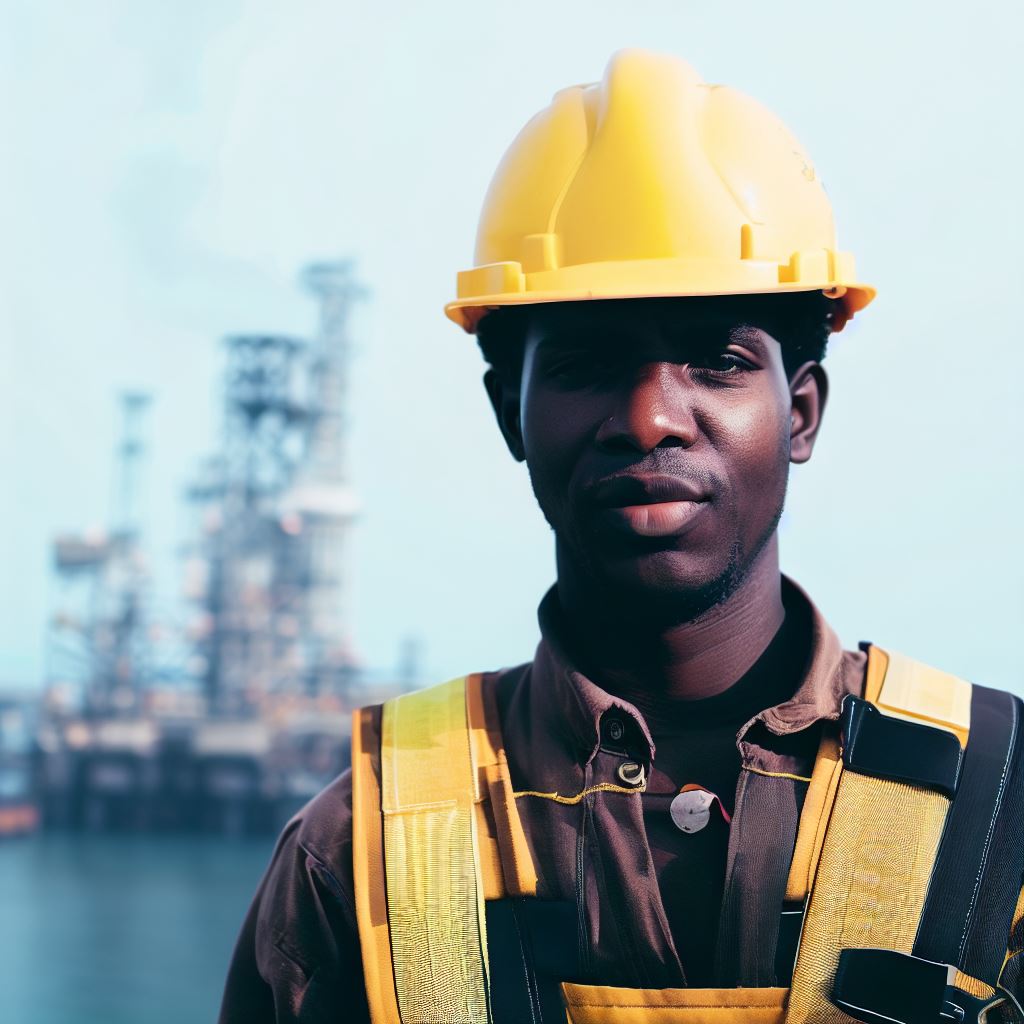
Gain More Insights: Impact of Technology on Nigeria’s Travel & Transport Jobs
Challenges in Implementing Safety Protocols
Implementing safety protocols in any industry can be a challenging task due to various reasons.
When it comes to marine oilers in Nigeria, there are specific challenges that they face in ensuring safety onboard.
A. Common Challenges in Implementing Safety Protocols
- Lack of Awareness: Many individuals working as marine oilers in Nigeria may not be fully aware of the importance of safety protocols and their role in maintaining a safe working environment.
- Inadequate Training: Insufficient training and lack of knowledge about safety protocols can hinder their effective implementation.
- Limited Resources: The availability of necessary safety equipment, tools, and resources can be limited, making it difficult for marine oilers to carry out safety procedures effectively.
- Inconsistent Safety Procedures: Different vessels or shipping companies may have different safety protocols, creating confusion among marine oilers and leading to inconsistent implementation.
- Non-compliance: Some individuals may not take safety protocols seriously, leading to non-compliance and increased risks in the maritime industry.
B. Specific Challenges for Marine Oilers in Nigeria
In addition to the common challenges, marine oilers in Nigeria face certain specific issues that make implementing safety protocols even more demanding:
- Poor Infrastructure: The maritime infrastructure in Nigeria may not be adequately developed, making it difficult to ensure safety measures are in place.
- Inadequate Maintenance: Limited budgets and resources may result in poor maintenance of vessels, leading to increased safety risks for marine oilers.
- Security Concerns: Piracy and other security risks in Nigerian waters pose a significant challenge to the safety of marine oilers, making it essential to implement robust safety protocols.
- Language Barriers: The multinational crew onboard ships may face language barriers, which can hinder effective communication and understanding of safety protocols.
- Corruption: The presence of corruption within the maritime sector can lead to compromised safety measures and disregard for proper safety protocols.
C. Potential Solutions and Strategies to Overcome These Challenges
Despite the challenges faced, there are several potential solutions and strategies that can help overcome these obstacles and improve the implementation of safety protocols:
- Increased Awareness and Training: Conduct regular training programs to raise awareness among marine oilers about safety protocols and provide them with necessary training.
- Improved Infrastructure: Invest in developing and maintaining adequate maritime infrastructure to support the implementation of safety protocols.
- Enhanced Security Measures: Collaborate with government agencies to strengthen security measures in Nigerian waters to mitigate risks for marine oilers.
- Standardization of Procedures: Implement standardized safety protocols across vessels and shipping companies to ensure consistency and clarity.
- Regular Maintenance and Inspections: Allocate sufficient resources to ensure proper maintenance and regular inspections of vessels to identify and address safety concerns.
- Effective Communication: Establish clear communication channels and overcome language barriers to ensure effective communication of safety protocols.
- Strict Regulations and Enforcement: Strengthen regulatory framework and enforce strict penalties for non-compliance to foster a culture of safety within the maritime industry.
In review, implementing safety protocols in the maritime industry, particularly for marine oilers in Nigeria, is not without its challenges.
However, by addressing these challenges and adopting the suggested solutions and strategies, it is possible to enhance safety measures and protect the well-being of marine oilers operating in Nigerian waters.
Case Studies: Successful Implementation of Safety Protocols
In this section, we will examine successful examples of companies and organizations that have effectively implemented safety protocols for marine oilers.
By analyzing the factors contributing to their success, we can draw valuable lessons and recommendations.
A. TotalEnergies
- Implemented comprehensive safety protocols for all marine oilers in their fleet.
- Established a safety culture through regular training programs and safety awareness campaigns.
- Invested in modern safety equipment and technologies to enhance onboard safety.
- Encouraged open communication channels for reporting safety concerns and near-miss incidents.
- Regularly evaluated and updated their safety protocols based on lessons learned.
1. Factors contributing to their success
- Strong leadership commitment to prioritize safety and provide necessary resources.
- Empowered and proactive safety officers who championed safety protocols.
- Collaborated with industry experts and regulatory bodies to stay updated on best practices.
- Gathered feedback from marine oilers and incorporated their inputs into safety protocols.
2. Lessons and recommendations
- Establishing a safety culture requires continuous efforts and regular reinforcement.
- Investing in modern safety equipment and technologies improves onboard safety.
- Encouraging open communication ensures timely reporting and resolution of safety concerns.
- Regular evaluation and updates of safety protocols are crucial for staying ahead of potential risks.
B. Chevron
- Implemented a robust safety management system specifically tailored for marine oilers.
- Conducted regular safety drills and simulations to prepare oilers for emergency situations.
- Promoted a safety-first mindset through recognition programs and incentives.
- Established a dedicated safety committee to monitor and improve safety performance.
- Encouraged a proactive reporting culture with a non-punitive approach towards near-miss incidents.
1. Factors contributing to their success
- Clear and concise safety policies and procedures that are easily accessible for all oilers.
- Provided adequate training and resources to ensure oilers can effectively implement safety protocols.
- Regularly reviewed and updated their safety management system based on industry advancements.
- Implemented a feedback system to gather oiler’s suggestions for improving safety protocols.
2. Lessons and recommendations
- Developing a tailored safety management system enhances effectiveness and relevance.
- Regular safety drills and simulations prepare oilers for emergency situations.
- Recognition programs and incentives motivate oilers to prioritize safety in their daily operations.
- Creating a non-punitive reporting culture encourages open communication and learning from incidents.
By studying these successful case studies, it is evident that effective implementation of safety protocols for marine oilers requires a combination of leadership commitment, proactive measures, continuous evaluation, and a culture of safety.
Companies and organizations should strive to adopt these best practices and tailor them to their specific operational needs to ensure the well-being of their marine oilers and the prevention of accidents and emergencies at sea.
Conclusion
Safety protocols for marine oilers in Nigeria play a crucial role in ensuring the well-being of individuals and the success of organizations.
It is important to prioritize safety in order to prevent accidents and protect lives. Both individuals and organizations have the responsibility to implement and adhere to these protocols.
Individuals must be vigilant and follow the outlined safety measures to protect themselves and their colleagues.
Organizations must provide proper training, equipment, and support to ensure the safety of their employees.
The importance of safety protocols cannot be overstated. They are designed to prevent accidents, injuries, and even fatalities in the hazardous marine oiling industry.
By following these protocols, individuals can minimize risks and create a safe working environment.
It is essential for all marine oilers in Nigeria to recognize the significance of safety and make it a priority in their daily operations.
By doing so, they not only protect themselves but also contribute to the overall well-being of the industry.
Safety protocols are the cornerstones of a successful and safe marine oiling industry in Nigeria.
By understanding their importance, emphasizing individual and organizational responsibilities, and prioritizing safety, we can ensure a secure environment for all involved.
Let us not take safety for granted, but rather, let us actively implement and follow the outlined protocols for the benefit of everyone involved in marine oiling operations.

